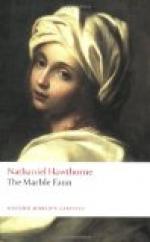“Still two days more!” murmured the sculptor.
“Ah, you are cruel now! More cruel than you know!” exclaimed Miriam, with another gleam of that fantastic, fitful gayety, which had more than once marked her manner during this interview. “Spare your poor friends!”
“I know not what you mean, Miriam,” said Kenyon.
“No matter,” she replied; “you will understand hereafter. But could you think it? Here is Donatello haunted with strange remorse, and an unmitigable resolve to obtain what he deems justice upon himself. He fancies, with a kind of direct simplicity, which I have vainly tried to combat, that, when a wrong has been done, the doer is bound to submit himself to whatsoever tribunal takes cognizance of such things, and abide its judgment. I have assured him that there is no such thing as earthly justice, and especially none here, under the head of Christendom.”
“We will not argue the point again,” said Donatello, smiling. “I have no head for argument, but only a sense, an impulse, an instinct, I believe, which sometimes leads me right. But why do we talk now of what may make us sorrowful? There are still two days more. Let us be happy!”
It appeared to Kenyon that since he last saw Donatello, some of the sweet and delightful characteristics of the antique Faun had returned to him. There were slight, careless graces, pleasant and simple peculiarities, that had been obliterated by the heavy grief through which he was passing at Monte Beni, and out of which he had hardly emerged when the sculptor parted with Miriam and him beneath the bronze pontiffs outstretched hand. These happy blossoms had now reappeared. A playfulness came out of his heart, and glimmered like firelight in his actions, alternating, or even closely intermingled, with profound sympathy and serious thought.
“Is he not beautiful?” said Miriam, watching the sculptor’s eye as it dwelt admiringly on Donatello. “So changed, yet still, in a deeper sense, so much the same! He has travelled in a circle, as all things heavenly and earthly do, and now comes back to his original self, with an inestimable treasure of improvement won from an experience of pain. How wonderful is this! I tremble at my own thoughts, yet must needs probe them to their depths. Was the crime—in which he and I were wedded—was it a blessing, in that strange disguise? Was it a means of education, bringing a simple and imperfect nature to a point of feeling and intelligence which it could have reached under no other discipline?”
“You stir up deep and perilous matter, Miriam,” replied Kenyon. “I dare not follow you into the unfathomable abysses whither you are tending.”
“Yet there is a pleasure in them! I delight to brood on the verge of this great mystery,” returned she. “The story of the fall of man! Is it not repeated in our romance of Monte Beni? And may we follow the analogy yet further? Was that very sin,—into which Adam precipitated himself and all his race, was it the destined means by which, over a long pathway of toil and sorrow, we are to attain a higher, brighter, and profounder happiness, than our lost birthright gave? Will not this idea account for the permitted existence of sin, as no other theory can?”




